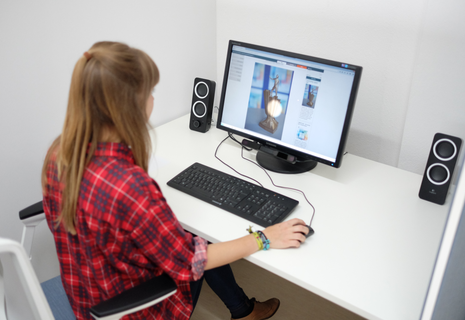Teaching Sectors
The university education of the IMIS is centred around our bachelor- and masterstudies Media Informatics with their focus on human-computer-interaction, based on computer science, psychology, design and media engineering. With a high proportion of internships and projects, we teach our students how to practically apply theoretical foundations. The theses from students (see bachelor theses and master theses) are integrated within research projects. Prof. Dr.-Ing. Nicole Jochems as head of the studies program and her coordinating team are happy to answer questions surrounding the bachelor's and master's program.
Design

Interaction and media design offers system models, concepts and components for creating multimedia and interactive systems. We can use insights and methods from system theory, computer science, and design to design, develop, and test interfaces that are usable and innovative - always with the future users in mind.
Computer science

Programming and Software Engineering, Algorithms and Data Structures, Mathematical Foundations, Technical and Theoretical Computer Science, Databases and Operating Systems: Computer science is and will be the foundation for media informatics. Competencies and capabilities taught in our lectures are being applied and deepened within internships and projects from diverse contexts.
Psychology

Psychology offers a deeper understanding of how interfaces affect different users, which supports the designing of systems. Our study program conveys foundations from perceptional and cognitive psychology as well as industrial and media psychology and deepens these competencies within the master's program in the areas of social, engineering, motivational and emotional psychology.
Further information on the study program Media informatics can be accessed through the following links:
Website of the teaching sector Media informatics 
Bachelor's program from the teaching sector Media informatics 

Other courses from the IMIS
In addition, the IMIS offers the advanced module Digital Health within the master's program Health and Healthcare Science and other courses within MINT study programs.
The course Human-Computer-Interaction (CS3010) is obligatory for the study programs Computer Science and IT-Security und offered as optional for the study programs Entrepreneurship in digital technologies, Robotics and Autonomous Systems, Medical Informatics as well as Psychology.
Since the winter term 2019/2020, the university of Lübeck offers the master's program Health and Healthcare Science. Besides the course Introduction into Digital Health, the program includes the advances module Digital Health and its courses Methods and processes in the development of technical systems and Human-Machine-Systems as well as the Project Digital Health (in cooperation with the Institute for Telematics).